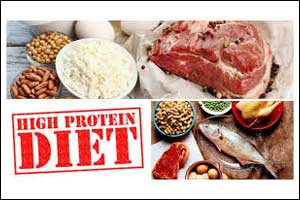- Home
- Editorial
- News
- Practice Guidelines
- Anesthesiology Guidelines
- Cancer Guidelines
- Cardiac Sciences Guidelines
- Critical Care Guidelines
- Dentistry Guidelines
- Dermatology Guidelines
- Diabetes and Endo Guidelines
- Diagnostics Guidelines
- ENT Guidelines
- Featured Practice Guidelines
- Gastroenterology Guidelines
- Geriatrics Guidelines
- Medicine Guidelines
- Nephrology Guidelines
- Neurosciences Guidelines
- Obs and Gynae Guidelines
- Ophthalmology Guidelines
- Orthopaedics Guidelines
- Paediatrics Guidelines
- Psychiatry Guidelines
- Pulmonology Guidelines
- Radiology Guidelines
- Surgery Guidelines
- Urology Guidelines
High-protein diet may harm kidneys, claim experts

Taking low carbohydrate diet and substituting carbohydrates proteins has become a leading dogma for all those who care for their looks and health. A high-protein diet is believed to keep you fit and help you lose fat and retain lean muscle mass.
In an article published in Nephrology Dialysis Transplantation, Dr Kamyar Kalantar-Zadeh, Dr Holly M Kramer and Dr Denis Fouque have unleashed the taboo and proclaimed that High-protein diet is bad for kidney health. They consider it necessary to question this belief and to put a tough warning label on our modern eating habits. "We may save calories, but we may also risk the health of our kidneys."
The promise of saving calories and losing weight is why a high-protein diet is very often recommended to people who suffer from diabetes or who are obese. But the crux of the matter is that these groups of people are especially vulnerable to the kidney-harming effects of high protein intake. "A high-protein diet induces glomerular hyperfiltration, which, according to our current state of knowledge, may boost a pre-existing low-grade chronic kidney disease, which, by the way, is often prevalent in people with diabetes. It might even increase the risk of de novo kidney diseases", explains Prof Fouque, past-chair of the European Renal Nutrition Working Group. "To put it in a nutshell: To recommend a high-protein diet to an overweight diabetes patient may indeed result in loss of weight, but also in a severe loss of kidney function. We want one, but we also get the other."
In view of the rising number of people affected by type-2 diabetes, and the fact that at least 30% of patients with diabetes suffer from underlying chronic kidney disease, the experts believe it is high time that the diabetes population and the general public are warned. "By advising people - especially those with a high risk for chronic kidney disease, namely patients with diabetes, obese people, people with a solitary kidney and probably even elderly people - to eat a protein-rich diet, we are ringing the death bell for their kidney health and bringing them a big step closer to needing renal replacement therapy", says Fouque. This is the essence of the editorial by the three authors mentioned above, which has been published along with two new studies on that topic in the current issue of NDT. The analysis of a Dutch cohort [2] showed a strictly linear association between daily protein intake and decline in kidney function. The higher the intake, the faster the decline. The result of an epidemiological study conducted in South Korea [3] points to the same direction: Persons with the highest protein intake had a 1.3 higher risk of faster GFR loss. The finding itself is not new. Many previous studies have shown that a high-protein diet may harm kidney function, and this is why patients with a known early-stage chronic kidney disease are recommended a low-protein diet by their nephrologists. As long as it is unclear whether it makes any difference if the proteins are animal- or plant-based, the recommendation is to abstain in general from high protein intake.
However, as Fouque and his colleagues point out, the problem are the people who have mild chronic kidney disease which they are totally unaware of and who follow the trend of eating a protein-rich diet because they believe it is healthy. "These people do not know that they are taking the fast lane to irreversible kidney failure". Prof Fouque and his ERA-EDTA colleagues want to start an information campaign and raise awareness for this problem among the general population. "It is essential that people know there is another side to high-protein diets, and that incipient kidney disease should always be excluded before one changes one eating habits and adopts a high-protein diet."
Nephrology Dialysis Transplantation
For more details click on the link: http://dx.

Disclaimer: This site is primarily intended for healthcare professionals. Any content/information on this website does not replace the advice of medical and/or health professionals and should not be construed as medical/diagnostic advice/endorsement or prescription. Use of this site is subject to our terms of use, privacy policy, advertisement policy. © 2020 Minerva Medical Treatment Pvt Ltd